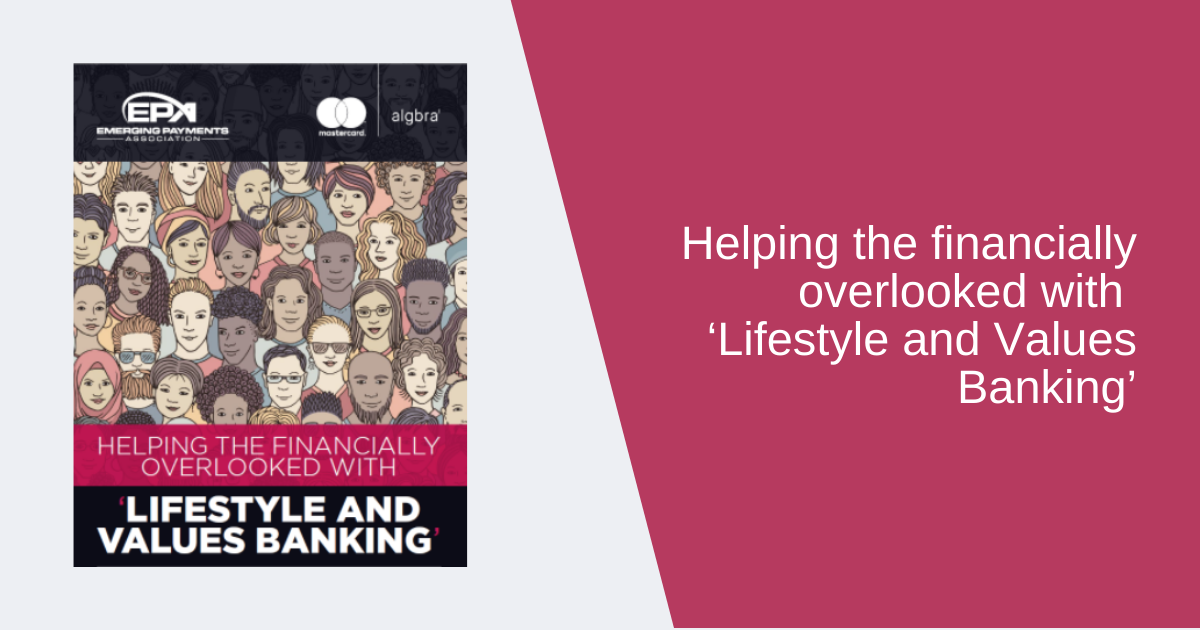Latest insight, Helping the Financially Overlooked, reflects on a transformational global pivot from ease of access to embrace, complement and promote customers’ identities
London, UK – 23rd September 2021: A report released by the Emerging Payments Association (EPA) on Lifestyle and Values Banking, in partnership with Algbra and Mastercard, shows that minority communities around the world are still the most financially underserved, including the LGBTQ+ community, faith-based communities, the elderly and others. The report also maps the landscape of lifestyle and values banking propositions that are making the retail banking industry more inclusive and equitable for all.
The term “financial exclusion” is often associated with a lack of access to finance, poor creditworthiness, or simply poor financial education. In reality, even people with excellent credit and access may still not have access to financial services that meet their lifestyle and values-based needs. The EPA’s report finds that the UK, for example, may provide access to financial services but by not accounting for the unique needs of specific communities, it is not as financially inclusive as it should be if we are to have a truly financially inclusive society. This has resulted in a significant segment of the population with needs that are financially overlooked in favour of a lowest-common denominator approach to finance.
The paper also finds that there has been a surge in innovative new B2C players focused on serving the financially overlooked communities in accordance with their specific needs, with the operational agility and a personalised product-offering.
It is for this reason that the digital banking landscape has evolved from one of a few large players serving the masses to multiple players serving specific communities. As this evolution continues, we are seeing the emergence of lifestyle and values banking solutions, with new players catering to the needs of key customer demographics, including sustainability, faith, gender, sexuality, race, and age.
This is thanks to consumer trends dictating the change in direction as they demand more holistic solutions that cater to all aspects of their life and are personalised to their specific needs. Two thirds of banking customers say they would share more data if it led to new benefits, and 86% of people expect lifestyle portals enabling people to manage every aspect of their lives to become mainstream within the next five years.
The report maps the landscape of lifestyle and values banking propositions that are available today. It demonstrates the existence of large underserved communities across demographics seeking a more nuanced understanding of their financial needs. It also explores how further advancements in technology and data analytics is enabling the development of this new segment and increasing customer demand for bespoke solutions is demonstrating the increasingly important role this segment in the market will play in the coming years.
The EPA, Mastercard, and Algbra make seven key recommendations on the core components that are driving an evolution towards lifestyle and values banking solutions:
- Consumers are demanding more from their financial institutions and are willing to share more data to get the products and services that cater to their needs.
- Advances in technology and data analytics are enabling organisations to execute on what customers are demanding through personalised financial products and services.
- There are significant segments of the global population who have been underserved by financial institutions leading to industrial scale inefficiencies and billions of pounds yet to be captured, making this a financially rewarding endeavour for real innovators that are still emerging.
- Education is a core pillar of all of these platforms.
- As new solutions emerge a partnership driven approach must be adopted, working with existing players to enable the delivery of the best products and services
- Inclusive design must be at the heart of product development and product thinking
- Supply chains must be aligned with the increasingly demanding clients who are entering the market. Key suppliers like Marqeta and Mastercard are adapting to the changing needs of customers and are enabling the development of these more personalised solutions.
Tony Craddock, Director General at the EPA, commented: “The UK is at the forefront of financial services globally, but there is an undercurrent of the financially overlooked. There are too many communities that may have access to financial services, but they are not having their needs met. As such, we’re about to see a significant shift in the landscape of banking solutions and how customers engage with their banks. Failure for companies to adapt will absolutely mean they are left behind.”
Josh Berle, Business Development Director at Mastercard, said: “Mastercard is motivated to do well by doing good. It is hugely exciting and gratifying for us to help mobilise the many innovative ideas that fintech is generating to widen availability of financial products and services.”
Nizam Uddin OBE, Chief Strategy Officer at Algbra, said: “To begin the process of serving the financial needs of underserved and overlooked communities, we need to be able to understand them. Only then can we start the journey to a more systemic approach to inclusion. This is what we hope this report begins to do and shows an exciting new development within the digital banking space. But it’s only the beginning and we have a lot more work to do. That’s why we at Algbra are committed to enabling the financial growth of communities and we have been thrilled to see this vision shared across the world, across communities and across the value chain.”
To download a copy of the guide, please visit: https://www.emergingpayments.org/whitepaper/helping-the-financially-overlooked-with-lifestyle-and-values-banking/
For more information on the work and services of the EPA you can visit www.emergingpayments.org or you can speak directly to the EPA at info@emergingpayments.org
About the EPA
The Emerging Payments Association (EPA), established in 2008, sets out to make payments work for everyone. To achieve this, it runs a comprehensive programme of activities for members with guidance from an independent Advisory Board of 17 payments CEOs.
These activities include a programme of digital and (when possible) face-to-face events including an online annual conference and broadcast awards dinner, numerous briefings and webinars, CEO Round Tables, and networking and training activities. The EPA also runs six stakeholder working groups. More than 100 volunteers collaborate on the important challenges facing our industry today, such as financial inclusion, recovering from Covid-19, financial crime, regulation, access to banking and promoting the UK globally. The EPA also produces research papers and reports to shed light on the big issues of the day and works closely with industry stakeholders such as the Bank of England, the FCA, HM Treasury, the Payment Systems Regulator, Pay.UK, UK Finance and Innovate Finance.
The EPA has over 130 members that employ over 300,000 staff and process more than £7tn annually. Its members come from across the payments value chain including payments schemes, banks and issuers, merchant acquirers, PSPs, retailers, TPPs and more. These companies have come together to join our community, collaborate, and speak with a unified voice.
The EPA collaborates with its licensees at EPA EU and EPA Asia to create an interconnected global network of people passionate about making payments work for all.
About Mastercard
Mastercard is a global technology company in the payments industry. Our mission is to connect and power an inclusive, digital economy that benefits everyone, everywhere by making transactions safe, simple, smart and accessible. Using secure data and networks, partnerships and passion, our innovations and solutions help individuals, financial institutions, governments and businesses realize their greatest potential. Our decency quotient, or DQ, drives our culture and everything we do inside and outside of our company. With connections across more than 210 countries and territories, we are building a sustainable world that unlocks priceless possibilities for all.
About Algbra
Algbra is a next generation fintech platform headquartered in London, leveraging state-of the-art technology, working with tier one partners and operating within the UK regulatory framework. The Algbra platform is built to create a values-based ecosystem that fits with the everyday financing needs of ethically-minded consumers, offering products and services that have the following principles at its heart – transparency, fairness, sustainability and non-interest based finance. Combining grassroots community understanding with global expertise, Algbra will provide products and services to enhance the financial wellness of overlooked UK communities and facilitate global social mobility.







